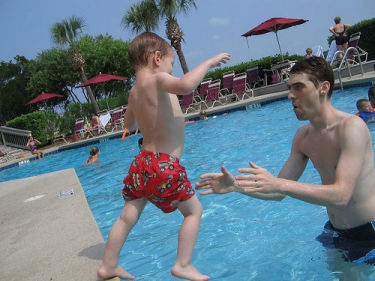
So, for instance, is may be scary to put your head under the water, but is it actually dangerous? Or, if you "do the right thing" and stand up for your friend against the taunts of that annoying kid, is that actually dangerous? So real courage is noticing the fear and supporting yourself through it, so you can act in accordance with your values.
- Will your second grader have the courage to admit she trampled the neighbor’s prize lilies?
- Will your fourth grader have the courage to stand up for a smaller child against the playground bully?
- Will your sixth grader have the courage to listen to the jazz he loves, when the other kids are into rap?
- Will your eighth grader have the courage to refuse to cheat on the test, even though the other kids are all doing so and his score will look worse by comparison?
- Will your tenth grader have the courage to refuse the sexual advances of an intimidating teacher?
- Will your 12th grader insist that the drunk driver stop the car and let him out, despite the taunts and dares of his friends?
Parents of toddlers and preschoolers often worry about their children's fears of thunderstorms or merry-go-rounds, but in our culture, courage is usually moral, rather than physical, and our children are tested constantly.
Of course, there are times when kids need your help to summon up their physical courage: when your toddler is frightened of riding the ferris wheel with you, or your five year old is afraid of the dark, or your seven year old doesn’t want to get on a horse, or your nine year old doesn't feel ready for sleepovers. But handling these frightening situations is pretty straight-forward:
1. Don’t push kids to take risks they don’t feel ready for.
They can learn to horseback ride next year.
2. Stay calm yourself, and empathize with their feelings.
This isn't an emergency; it's a learning opportunity.
3. Communicate that you will keep her safe.
No one can think clearly when their nervous system thinks it's an emergency.
4. Help your child to problem solve.
Would it help if he knew he could call you from the sleepover? Could he start getting to know the horse at first by grooming it, rather than climbing up into the saddle?
5. Encourage your child to turn his fear into excitement.
Scientists -- and thrill seekers -- tell us they’re related.
Moral courage is more complicated. Luckily, it isn't something we're born with. Courage is something we can develop, cultivate, learn how to summon up, by trial and error, by facing scary situations, choosing what's right, and finding out it works.
Moral Courage
"The ultimate measure of a man is not where he stands in moments of comfort and convenience, but where he stands in times of challenge and controversy."
-Martin Luther King, Jr.
The good and bad news about moral courage is that your child’s performance in difficult situations depends mostly on you. Not on what you say, or drill into your child, about what’s right and wrong. Those discussions are important so that kids clearly understand what’s right and wrong and why we make certain choices, but they aren't what matters most.
Research confirms what we observe daily: most humans don’t always do what they know is right. Integrity cannot be taught. Whether your son or daughter will summon up the internal fortitude to do what’s right will depend on who he or she is as a person, and that, luckily, you can impact tremendously.
In fact, the little test below – about you – can accurately predict your child’s behavior.
- Do you tell the store clerk when she inadvertently gives you too much change?
- Can you admit to your child when you’re wrong?
- Do you speak up to the baseball coach and tell him that boy on the bench – the one you don’t know, who flubbed his last play – needs a chance to play, at least a little, in every game?
- Do you make it safe for your child to admit to you when she makes a mistake, even a big one? Or does she feel she needs to lie to you, ever?
- Do you support your child when she thinks an adult is wrong, and help her to make her case?
- What do you do when you discover your child took the Gameboy from the dentist’s office? Do you yourself ever take a magazine you like? Do you ever take pens, pads or other supplies from work?
- Do you tell your boss when you think she’s asking you to do something that borders on unethical?
- Do you ever lie about your child's age to get the lower admission price?
- Do you regularly give some portion of your income to charity?
Is it hard to believe that this test can predict your child's behavior? Researchers confirm that children learn what we do, not what we say.
So the first part of helping your child to develop moral courage is to develop your own.
The second, of course, is paying attention to all the teachable moments. Not to lecture, but to recognize, aloud, how hard the choice is. And to ask your child what they will consider as they make the choice. How do they want to see themselves? What kind of person do they want to be?
The third part of supporting your child to develop moral courage is remembering that kids develop courage along with maturity, over time. Don't take it too hard when your child doesn't display the courage you'd like. Just having a parent who thinks about these things is taking her in the right direction. Give her time.
"Courage is not the absence of fear, but rather the judgment that something else is more important than fear."
-Ambrose Redmoon





